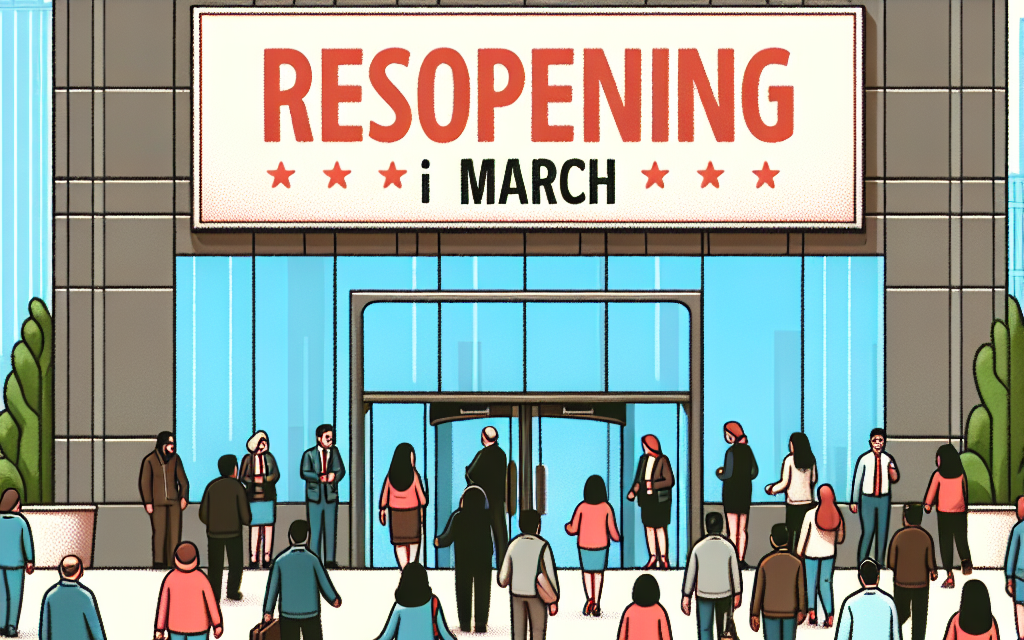“JPMorgan Reinforces Commitment to Collaboration with Full-Time Office Return Starting March.”
Introduction
JPMorgan Chase has announced a mandate requiring employees to return to the office full-time starting in March. This decision reflects the bank’s commitment to fostering collaboration, innovation, and a strong corporate culture as it navigates the post-pandemic landscape. The move aims to enhance teamwork and productivity, aligning with the company’s strategic goals while ensuring a cohesive work environment.
JPMorgan’s Decision on Full-Time Office Return
In a significant move reflecting the evolving dynamics of the workplace, JPMorgan Chase has announced a mandate requiring employees to return to the office full-time starting in March. This decision underscores the bank’s commitment to fostering a collaborative environment that is often best achieved through in-person interactions. As organizations worldwide grapple with the implications of remote work, JPMorgan’s directive serves as a pivotal example of a major financial institution prioritizing traditional office settings.
The rationale behind this mandate is multifaceted. First and foremost, JPMorgan believes that in-person collaboration enhances productivity and innovation. By bringing employees back to the office, the bank aims to leverage the synergies that arise from spontaneous discussions and face-to-face meetings, which are often difficult to replicate in a virtual environment. Furthermore, the company recognizes that the financial services industry thrives on teamwork and relationship-building, both of which are more effectively cultivated in a shared physical space.
Moreover, this decision aligns with broader trends observed in the corporate world, where many companies are reevaluating their remote work policies. As the pandemic has progressed, organizations have begun to recognize the limitations of remote work, particularly in terms of employee engagement and corporate culture. By mandating a full-time return to the office, JPMorgan is not only reinforcing its commitment to a cohesive workplace culture but also signaling to its employees the importance of being present in the office to contribute to the company’s goals.
In addition to fostering collaboration, JPMorgan’s decision also reflects a strategic response to the competitive landscape of the financial sector. As firms vie for top talent, the ability to offer a dynamic and engaging work environment becomes increasingly crucial. By encouraging employees to return to the office, JPMorgan aims to create a vibrant workplace that attracts and retains skilled professionals who thrive in collaborative settings. This approach is particularly relevant in an industry where networking and personal connections can significantly impact career advancement and business success.
Transitioning back to a full-time office model, however, is not without its challenges. Employees have grown accustomed to the flexibility that remote work offers, and some may be resistant to returning to a structured office environment. To address these concerns, JPMorgan is likely to implement measures that ease the transition, such as flexible work hours or hybrid models that allow for a gradual return. By acknowledging the diverse needs of its workforce, the bank can foster a smoother transition while maintaining its commitment to in-person collaboration.
Furthermore, as the world continues to navigate the complexities of the post-pandemic landscape, JPMorgan’s decision may also serve as a bellwether for other organizations contemplating similar policies. The bank’s leadership is keenly aware that its actions could influence industry standards and set a precedent for how financial institutions approach workplace dynamics in the future. As such, the decision to mandate a full-time return to the office is not merely an internal policy change; it is a strategic move that could reshape the broader corporate landscape.
In conclusion, JPMorgan’s mandate for a full-time office return starting in March reflects a deliberate strategy to enhance collaboration, strengthen corporate culture, and respond to the competitive demands of the financial sector. While the transition may present challenges, the bank’s commitment to fostering an engaging workplace environment underscores its belief in the value of in-person interactions. As other organizations observe JPMorgan’s approach, the implications of this decision may resonate far beyond the walls of the bank, influencing workplace policies across various industries.
Impact of JPMorgan’s Office Return Mandate on Employee Morale
JPMorgan Chase’s recent decision to mandate a full-time return to the office for its employees starting in March has sparked considerable discussion regarding its potential impact on employee morale. As one of the largest financial institutions in the world, JPMorgan’s policies often set trends that ripple through the corporate landscape, influencing not only its own workforce but also the broader industry. The return-to-office mandate reflects a growing sentiment among many organizations that in-person collaboration is essential for fostering innovation, maintaining company culture, and enhancing productivity. However, this shift raises important questions about how employees will respond to such a directive, particularly in light of the flexibility many have enjoyed during the pandemic.
To begin with, it is essential to recognize that the pandemic has fundamentally altered the way employees perceive work-life balance. Many individuals have grown accustomed to the flexibility of remote work, which has allowed them to manage personal responsibilities alongside their professional obligations. Consequently, the abrupt transition back to a full-time office environment may lead to feelings of frustration and resentment among employees who have thrived in a remote setting. This sentiment could be exacerbated by concerns over commuting, childcare, and other logistical challenges that were less pronounced during the remote work period. As a result, employee morale may take a hit, particularly among those who feel that their needs and preferences are not being adequately considered.
On the other hand, it is important to acknowledge that some employees may welcome the return to the office. For many, the office environment serves as a hub for social interaction, collaboration, and professional development. The spontaneous conversations and brainstorming sessions that occur in person can lead to innovative ideas and stronger team dynamics. Furthermore, the office can provide a clearer separation between work and home life, which some employees may find beneficial for their mental well-being. Thus, while the mandate may initially dampen morale for some, it could also rejuvenate the spirits of those who thrive in a structured office environment.
Moreover, the impact of this mandate on employee morale will likely depend on how JPMorgan implements the transition. Clear communication regarding the rationale behind the decision, as well as an emphasis on the benefits of in-person collaboration, can help mitigate negative feelings. Additionally, offering support systems, such as flexible hours or hybrid work options, may ease the transition and demonstrate that the company values its employees’ well-being. By fostering an environment of transparency and understanding, JPMorgan can help bridge the gap between management’s objectives and employees’ preferences.
Furthermore, the long-term effects of this mandate on employee morale will also hinge on the company’s ability to adapt to feedback. If employees feel that their concerns are being heard and addressed, they are more likely to embrace the return to the office. Conversely, if the mandate is perceived as rigid and unyielding, it could lead to disengagement and decreased productivity. Therefore, it is crucial for JPMorgan to remain attuned to its workforce’s sentiments and to cultivate a culture of open dialogue.
In conclusion, while JPMorgan’s full-time office return mandate may present challenges to employee morale, it also offers opportunities for growth and collaboration. The key to navigating this transition lies in effective communication, support, and responsiveness to employee needs. By striking a balance between organizational goals and individual preferences, JPMorgan can foster a positive work environment that ultimately enhances morale and productivity.
Comparison of JPMorgan’s Return Policy with Other Financial Institutions
As the world gradually emerges from the disruptions caused by the COVID-19 pandemic, financial institutions are reevaluating their workplace policies to adapt to the evolving landscape. In this context, JPMorgan Chase has taken a decisive step by mandating a full-time return to the office for its employees starting in March. This policy marks a significant shift in the bank’s approach to remote work, reflecting a broader trend among financial institutions as they navigate the complexities of post-pandemic operations. To understand the implications of JPMorgan’s decision, it is essential to compare its return-to-office policy with those of other major financial institutions.
In contrast to JPMorgan’s firm stance, several banks have adopted a more flexible approach to remote work. For instance, Goldman Sachs has encouraged a hybrid model that allows employees to split their time between the office and remote work. This strategy aims to balance the benefits of in-person collaboration with the flexibility that many employees have come to appreciate. By allowing employees to choose their work environment, Goldman Sachs seeks to foster a culture of trust and autonomy, which can enhance job satisfaction and productivity.
Similarly, Bank of America has implemented a hybrid work model, permitting employees to work remotely for a portion of the week. This approach reflects a growing recognition of the importance of work-life balance and employee well-being. By offering flexibility, Bank of America aims to attract and retain top talent in a competitive labor market, where many employees are seeking arrangements that accommodate their personal needs and preferences. In this regard, the bank’s policy stands in stark contrast to JPMorgan’s more rigid requirement for a full-time office presence.
Moreover, Citigroup has also embraced a hybrid work model, allowing employees to work from home several days a week. This policy is indicative of a broader trend among financial institutions that recognize the value of flexibility in the modern workplace. Citigroup’s approach emphasizes the importance of employee engagement and morale, which can be significantly impacted by rigid return-to-office mandates. By providing employees with the option to work remotely, Citigroup aims to create a more inclusive and adaptable work environment.
While JPMorgan’s decision to mandate a full-time return to the office may be rooted in its commitment to fostering collaboration and maintaining a strong corporate culture, it raises questions about employee satisfaction and retention. As other financial institutions adopt more flexible policies, JPMorgan may face challenges in attracting and retaining talent, particularly among younger employees who prioritize work-life balance and remote work options. The contrasting approaches highlight a fundamental tension within the financial sector: the need for in-person collaboration versus the desire for flexibility.
In conclusion, JPMorgan’s mandate for a full-time office return stands in stark contrast to the more flexible policies adopted by other financial institutions such as Goldman Sachs, Bank of America, and Citigroup. As the industry continues to evolve, it will be crucial for JPMorgan to assess the long-term implications of its return policy on employee morale and retention. The ongoing dialogue surrounding workplace flexibility will undoubtedly shape the future of work in the financial sector, as institutions strive to find the right balance between collaboration and employee autonomy. Ultimately, the decisions made by these institutions will not only impact their internal dynamics but also set the tone for the broader financial landscape in the years to come.
Employee Reactions to JPMorgan’s Full-Time Office Requirement
In March, JPMorgan Chase announced a mandate requiring employees to return to the office full-time, a decision that has elicited a range of reactions from its workforce. As the largest bank in the United States, JPMorgan’s policies often set a precedent for other financial institutions, making this move particularly noteworthy. The directive, which aims to foster collaboration and enhance productivity, has sparked discussions about the evolving nature of work in the post-pandemic landscape.
Many employees have expressed concerns regarding the return to a traditional office environment. For some, the flexibility of remote work has become a cherished aspect of their professional lives, allowing for a better work-life balance. The ability to manage personal responsibilities alongside professional obligations has been a significant advantage for numerous staff members. Consequently, the prospect of returning to a rigid office schedule has led to feelings of anxiety and apprehension among those who have grown accustomed to the autonomy that remote work provides.
Conversely, there are employees who welcome the return to the office, viewing it as an opportunity to reconnect with colleagues and rebuild the camaraderie that can often be lost in virtual interactions. Many individuals thrive in collaborative environments, where spontaneous discussions and brainstorming sessions can lead to innovative solutions and stronger team dynamics. For these employees, the office represents a space for creativity and engagement that remote work may not fully replicate. They argue that in-person interactions can enhance communication and foster a sense of belonging within the company culture.
Moreover, the decision has prompted discussions about the broader implications for workplace culture and employee morale. Some employees feel that the mandate undermines the trust that was built during the pandemic, when many demonstrated their ability to work effectively from home. This sentiment raises questions about the balance between organizational goals and employee autonomy. As companies navigate the complexities of hybrid work models, the challenge lies in finding a solution that accommodates diverse preferences while still achieving business objectives.
In addition to the emotional responses, practical considerations also come into play. Employees are grappling with logistical challenges, such as commuting time and costs, which can significantly impact their daily routines. For those who relocated during the pandemic, the requirement to return to the office may necessitate difficult decisions about their living arrangements. This aspect of the mandate has led to discussions about the need for flexibility in work arrangements, as employees seek to align their professional responsibilities with their personal circumstances.
Furthermore, the return-to-office mandate has ignited conversations about the future of work in the financial sector. As companies reassess their operational strategies, there is a growing recognition that employee preferences must be taken into account. The pandemic has fundamentally altered perceptions of work, and organizations that fail to adapt may risk losing talent to competitors who offer more flexible arrangements. Thus, while JPMorgan’s decision reflects a desire to return to pre-pandemic norms, it also highlights the necessity for ongoing dialogue between management and employees regarding workplace policies.
In conclusion, JPMorgan’s full-time office return mandate has generated a spectrum of reactions among employees, reflecting the complexities of modern work environments. As the bank navigates this transition, it will be essential to consider the diverse perspectives of its workforce, ensuring that the path forward is one that fosters both productivity and employee satisfaction. The ongoing evolution of workplace dynamics will undoubtedly shape the future of work in the financial industry and beyond.
The Role of Hybrid Work Models in JPMorgan’s Strategy
As JPMorgan prepares to mandate a full-time office return for its employees starting in March, the implications of this decision extend beyond mere logistics; they reflect a broader strategy regarding hybrid work models. The pandemic has fundamentally altered the landscape of work, prompting many organizations to explore flexible arrangements that blend remote and in-office experiences. However, JPMorgan’s recent directive signals a shift back toward traditional office environments, raising questions about the future of hybrid work within the company and the financial sector at large.
In recent years, hybrid work models have gained traction as organizations sought to balance employee preferences with operational efficiency. These models typically allow employees to split their time between remote work and in-office attendance, fostering a sense of autonomy while maintaining collaboration and team cohesion. For many companies, this approach has proven beneficial, enhancing employee satisfaction and productivity. However, JPMorgan’s decision to return to a full-time office model suggests a reevaluation of these benefits in light of the company’s specific needs and culture.
The financial services industry, characterized by its fast-paced and collaborative nature, often relies on in-person interactions to drive innovation and decision-making. JPMorgan, as a leading global financial institution, recognizes that certain aspects of its operations thrive in a traditional office setting. The company has emphasized the importance of teamwork, mentorship, and spontaneous brainstorming sessions, all of which can be more effectively facilitated in person. By mandating a full-time return to the office, JPMorgan aims to reinforce these critical elements of its corporate culture, ensuring that employees remain engaged and connected.
Moreover, the decision to return to the office full-time may also be influenced by the need for enhanced oversight and accountability. In a hybrid model, employees may experience varying levels of productivity and engagement, which can complicate performance evaluations and team dynamics. By bringing employees back to the office, JPMorgan seeks to establish a more consistent work environment that fosters collaboration and accountability, ultimately driving better business outcomes. This approach aligns with the company’s commitment to maintaining high standards of service and operational excellence.
However, it is essential to recognize that the transition back to a full-time office model does not entirely dismiss the lessons learned during the pandemic. While JPMorgan is emphasizing in-person work, the company is likely to retain some elements of flexibility that emerged during the remote work period. For instance, the adoption of technology to facilitate virtual meetings and collaboration tools may continue to play a role in the company’s operations, allowing for a more integrated approach to work. This hybridization of practices could enable JPMorgan to adapt to future challenges while still prioritizing the benefits of in-person collaboration.
In conclusion, JPMorgan’s mandate for a full-time office return reflects a strategic decision rooted in the unique demands of the financial services industry. While hybrid work models have proven effective for many organizations, JPMorgan’s emphasis on in-person collaboration, accountability, and corporate culture underscores its commitment to maintaining a high-performance environment. As the company navigates this transition, it will be crucial to balance the advantages of traditional office work with the flexibility that employees have come to value. Ultimately, the evolution of work at JPMorgan will likely continue to adapt, reflecting both the lessons of the past and the realities of the future.
Implications for Workplace Culture at JPMorgan
JPMorgan’s recent decision to mandate a full-time return to the office for employees starting in March marks a significant shift in workplace culture, reflecting broader trends in the corporate world. This move underscores the bank’s commitment to fostering collaboration, innovation, and a cohesive work environment, which are often seen as challenging to achieve in a remote or hybrid setting. As organizations navigate the complexities of post-pandemic operations, JPMorgan’s approach may serve as a bellwether for other firms contemplating similar policies.
The implications of this mandate extend beyond mere attendance; they touch upon the very fabric of workplace culture at JPMorgan. By requiring employees to return to the office, the bank aims to reinforce a sense of community and belonging among its workforce. In-person interactions can enhance team dynamics, facilitate spontaneous brainstorming sessions, and strengthen relationships that are often diluted in virtual environments. Consequently, this policy may lead to increased employee engagement and morale, as individuals reconnect with colleagues and immerse themselves in the company’s culture.
Moreover, the return to the office is likely to influence the way work is conducted at JPMorgan. The bank has long emphasized the importance of mentorship and professional development, which are often more effectively nurtured in face-to-face settings. By bringing employees back together, JPMorgan can revitalize its training programs and mentorship initiatives, allowing for more personalized guidance and support. This shift could ultimately enhance career progression opportunities for employees, fostering a culture of growth and development that aligns with the bank’s strategic objectives.
However, it is essential to recognize that this mandate may also present challenges. Employees who have grown accustomed to the flexibility of remote work may resist the transition back to a structured office environment. This resistance could lead to dissatisfaction among staff, particularly if they perceive the policy as a regression rather than an opportunity for collaboration. To mitigate potential backlash, JPMorgan will need to communicate the rationale behind its decision clearly, emphasizing the benefits of in-person work while remaining receptive to employee feedback.
Furthermore, the mandate raises questions about work-life balance, a critical aspect of modern workplace culture. As employees return to the office, they may face increased commuting times and a more rigid daily schedule, which could impact their overall well-being. To address these concerns, JPMorgan might consider implementing flexible work arrangements or hybrid models that allow for a degree of autonomy while still promoting in-person collaboration. Such measures could help maintain employee satisfaction and retention, ensuring that the bank remains an attractive employer in a competitive job market.
In conclusion, JPMorgan’s decision to mandate a full-time return to the office carries significant implications for its workplace culture. While the move aims to enhance collaboration, mentorship, and employee engagement, it also necessitates careful consideration of employee sentiments and work-life balance. As the bank navigates this transition, it will be crucial to foster an environment that values both in-person interactions and the flexibility that many employees have come to appreciate. By striking this balance, JPMorgan can cultivate a resilient workplace culture that not only meets the demands of the present but also positions the organization for future success.
Future Trends in Office Work Post-JPMorgan’s Mandate
As JPMorgan Chase & Co. prepares to implement its mandate for a full-time return to the office starting in March, the implications of this decision extend far beyond the walls of the financial institution. This move signals a potential shift in workplace dynamics that could influence various sectors and reshape the future of office work. With many companies having adopted flexible work arrangements during the pandemic, JPMorgan’s directive may serve as a bellwether for other organizations contemplating similar policies.
In the wake of the pandemic, remote work became a viable alternative for many businesses, leading to a reevaluation of traditional office environments. Employees enjoyed the flexibility and work-life balance that remote arrangements provided, prompting discussions about hybrid models that combine both in-office and remote work. However, JPMorgan’s decision to require employees to return full-time may indicate a growing belief among some corporate leaders that in-person collaboration is essential for fostering innovation, maintaining company culture, and enhancing productivity. This perspective could encourage other firms to reconsider their own remote work policies, potentially leading to a resurgence of full-time office work across various industries.
Moreover, the mandate may also reflect a broader trend toward reestablishing workplace norms that were prevalent before the pandemic. As companies strive to rebuild their teams and reintegrate employees into a cohesive work environment, the emphasis on in-person collaboration may become increasingly pronounced. This could result in a renewed focus on office design and functionality, as organizations seek to create spaces that promote interaction and engagement among employees. Open floor plans, collaborative workspaces, and amenities that encourage socialization may become more common as companies invest in their physical environments to support a full-time workforce.
In addition to influencing office design, JPMorgan’s mandate may also have implications for employee recruitment and retention strategies. As organizations navigate the competitive labor market, the ability to offer flexible work arrangements has become a key differentiator for attracting top talent. However, with JPMorgan’s decision, there may be a shift in expectations among job seekers, who could begin to prioritize companies that offer a more traditional office experience. This shift could lead to a polarization in workplace policies, where some companies double down on remote work while others embrace a return to the office, creating a diverse landscape of employment options.
Furthermore, the return to full-time office work may also impact employee well-being and mental health. While some individuals thrive in a structured office environment, others may struggle with the transition back to a more rigid work schedule. Organizations will need to be mindful of these varying preferences and consider implementing support systems to help employees adjust. This could include mental health resources, flexible scheduling options, or hybrid models that allow for a gradual return to the office.
In conclusion, JPMorgan’s mandate for a full-time return to the office starting in March is likely to have far-reaching consequences for the future of work. As companies assess their own policies in light of this decision, we may witness a reemergence of traditional office environments, a reevaluation of employee expectations, and a renewed focus on workplace design. Ultimately, the landscape of office work is poised for transformation, as organizations navigate the complexities of balancing collaboration, productivity, and employee well-being in a post-pandemic world.
Q&A
1. **Question:** When is JPMorgan’s full-time office return for employees scheduled to start?
**Answer:** March.
2. **Question:** What is the primary reason for JPMorgan’s decision to mandate a full-time office return?
**Answer:** To enhance collaboration and productivity among employees.
3. **Question:** How many days a week are employees expected to be in the office?
**Answer:** Employees are expected to be in the office five days a week.
4. **Question:** Which employees are affected by this mandate?
**Answer:** The mandate applies to all employees who can perform their jobs on-site.
5. **Question:** What has been the company’s approach to remote work prior to this mandate?
**Answer:** JPMorgan had allowed flexible remote work arrangements during the pandemic.
6. **Question:** How has the company communicated this mandate to its employees?
**Answer:** The mandate was communicated through internal memos and meetings.
7. **Question:** What is the expected impact of this mandate on company culture?
**Answer:** The company aims to strengthen its culture and team dynamics through in-person interactions.
Conclusion
JPMorgan’s mandate for a full-time office return starting in March reflects a broader trend among major corporations to prioritize in-person collaboration and strengthen workplace culture post-pandemic. This decision underscores the bank’s commitment to fostering teamwork and maintaining operational efficiency, while also signaling a shift towards a more traditional work environment as the effects of remote work evolve.





